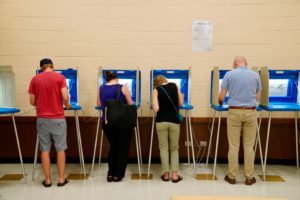“Elections belong to the people. It’s their decision. If they decide to turn their back on the fire and burn their behinds, then they will just have to sit on their blisters.” – Abraham Lincoln
“Democracy cannot succeed unless those who express their choice are prepared to choose wisely. The real safeguard of democracy, therefore, is education.” – Franklin Roosevelt
Two presidents. Two views. One common theme. It is the obligation of each citizen to exercise his or her right to vote.
O ur forefathers sought to establish a sovereign republic based upon the values of freedom, equality and civic responsibility. To that end, our Constitution embeds certain guarantees enfranchising the will of the individual through the ability to cast a vote. A vote that carries the power to affirm or reject a proposition or an ideology. A vote that bears the weight of those that gave their lives in defense of its ability to be cast.
ur forefathers sought to establish a sovereign republic based upon the values of freedom, equality and civic responsibility. To that end, our Constitution embeds certain guarantees enfranchising the will of the individual through the ability to cast a vote. A vote that carries the power to affirm or reject a proposition or an ideology. A vote that bears the weight of those that gave their lives in defense of its ability to be cast.
Without the added prestige of a national campaign such as presidential or senatorial election, a municipal election does not normally draw a lot of attention. Rare is the municipal primary or general election that sees more than 20% of registered voters actually cast a vote. Which begs the question of why — particularly in Carmel, Indiana — is voter apathy so prevalent.
“I’m doing fine. My neighborhood has what it needs. My taxes are low. I don’t have any reason to vote.”
“It doesn’t matter who I vote for. The same people keep getting elected every time.”
“My vote doesn’t count.”
These are all excuses heard by the current slate of candidates running for office in Carmel as they have canvassed neighborhoods within the city. Apathy and fatalism appear have to overcome optimism and a sense of being.
Historical data and research tell us that incumbents benefit from low voter turnout and often form their campaign strategies around ways to dissuade voters from going to the polls. After all, it’s much cheaper to run a campaign if a candidate doesn’t have to spend the additional resources on consultants, canvassing, media advertising and fundraising.
However, these are not normal times in Carmel. The incumbent mayor has spent nearly a quarter-century — half of his adult life — as mayor. His campaigns have been funded by a deep-pocketed assortment of developers, engineers and others that benefit handsomely from an agenda of debt-driven development and expansion. The very defense of this agenda alludes to attracting additional businesses to Carmel to increase tax revenue to the city. Which — in turn — forces more development (and more profit opportunities for the mayor’s campaign donors). And so the cycle continues as the incumbents at City Hall embrace an unsustainable level of dense development with no apparent end in sight.
Absolutely, these are not normal times in Carmel. An artificial downtown created with public-private “partnerships”. Tens of millions of your tax dollars spent on artworks for public rights-of-way without your input. Your Carmel property being collateralized without your consent into a citywide redevelopment district, so that a Special Benefits Tax can be assessed against it at any time when revenues from public-private “partnerships” do not meet debt-service obligations. Infrastructure within neighborhoods in a large section of Carmel receiving only basic services while the incumbent mayor and council focus upon creation and promotion of the artificial downtown.
Incumbents beat the loud drum about Carmel’s low residential property tax rates. Carmel voters should understand that this is a sleight of hand trick with numbers. These low rates are dependent upon the health of the local, regional, national and global economies. Any economic downturn — however how slight — will have a ripple effect that weakens demand for goods and services and cause companies to shrink their workforces in response. It will also cause a reduction in tax revenues paid to the city, forcing budget adjustments even as debt-service obligations increase. This, combined with the ordinary annual increases in operational costs and employee overhead, will force Carmel’s leaders to make tough choices regarding ongoing funding of services. Increases in the property tax rate have occurred annually between 2008-2016 before a modest decrease each of the past two years. A sizable increase in property tax rates for 2020 can be expected.
 There is a lot more at stake than simply preserving the status quo for another four years. Transparency, honesty and fiscal sustainability should be something every Carmel voter demands. Yet, it will not happen without your vote and the incumbents know it. They don’t want nor expect you to vote, regardless of their statements to the contrary.
There is a lot more at stake than simply preserving the status quo for another four years. Transparency, honesty and fiscal sustainability should be something every Carmel voter demands. Yet, it will not happen without your vote and the incumbents know it. They don’t want nor expect you to vote, regardless of their statements to the contrary.
No more excuses, Carmel. This is about YOUR future and that of future generations. Mark next Tuesday on your calendar. Find your polling place at https://indianavoters.in.gov Early voting is also available at the Carmel Clay Public Library Friday and Saturday, May 4th and 5th, between the hours of 10:00 AM – 3:00 PM.
Cast an informed vote on May 7th. The future of your community depends upon it.

brought to you by our friends at Essayists of Carmel, Indiana

